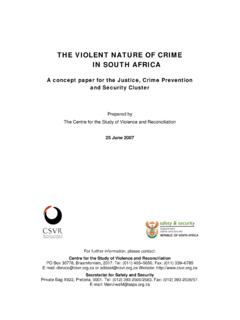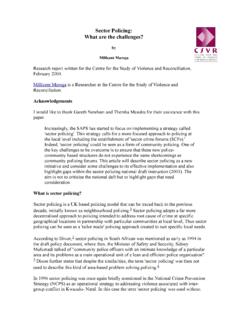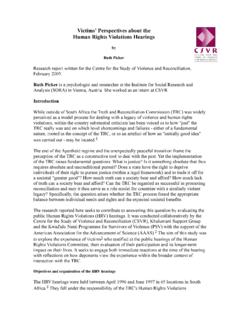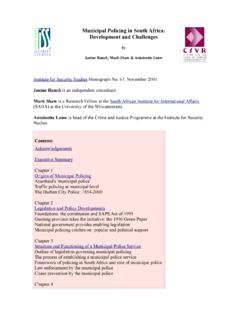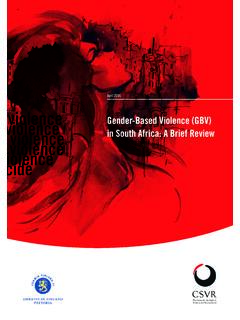Transcription of PRISONS IN SOUTH AFRICA’S CONSTITUTIONAL …
1 LUKAS MUNTINGHCENTRE FOR THE STUDY OF VIOLENCE AND RECONCILIATIONC riminal Justice ProgrammeOctober 2007 PRISONS IN SOUTH africa SCONSTITUTIONAL DEMOCRACYCSVRThe Centre for the Study ofViolence and ReconciliationCSVRLUKAS MUNTINGHPRISONS IN THE SOUTH AFRICAN CONSTITUTIONAL DEMOCRACYCSVRThe Centre for the Study ofViolence and ReconciliationCSVRS upported by Irish AidABOUT THE AUTHORL ukas Muntingh is project coordinator of the Civil Society Prison Reform Initiative, a project of the Community Law Centre at the University of the Western Cape. He holds a master s degree in sociology from the University of Stellenbosch. He has been involved in criminal justice reform for the past 15 years, focusing on child justice and prison reform in SOUTH africa as well as several southern African by the Centre for the Study of Violence and ReconciliationFor information contact:Centre for the Study of Violence and Reconciliation4th Floor, Braamfontein Centre23 Jorissen Street, BraamfonteinPO Box 30778, Braamfontein, 2017 Tel: +27 (11) 403-5650 Fax: +27 (11) 339-6785 2007 Centre for the Study of Violence and Reconciliation.
2 All rights and layout: Lomin SaaymanCONTENTSA cknowledgement 41. Introduction 52. An underlying philosophy 63. The rights requirement The residuum principle Dignity Freedom and security of the person Right to life Right to freedom from slavery and servitude Special protection for children in custody General rights of arrested, accused and detained persons Key issues in the rights requirement 154. Accountability Horizontal accountability and governance Horizontal accountability and the treatment of prisoners Vertical accountability and the electorate Vertical accountability and the media Vertical accountability and civil society Vertical accountability and the treaty bodies 235. Transparency 246.
3 Conclusion 26 References 29 ACKNOWLEDGEMENTThe publication of this report was made possible by the financial support received from Irish INTRODUCTIONP risons and prisoners are at the margins of society and even democracies tend to be parsimonious in giving real expression to prisoners rights. Popular notions of how prisoners should be treated gravitate towards increased suffering, but these are generally knee-jerk reactions fuelled by frustrations about the lack of public safety and the high rate of violent crime. It is often said, citing both Churchill and Dostoevsky, that the state of a democracy is measured by the way it treats its prisoners. But the relationship is indeed more interactive. What happens inside PRISONS does not stay there; it goes home with released prisoners and the staff who work there: When people live and work in facilities that are unsafe, unhealthy, unproductive, or inhumane, they carry the effects home with them (Gibbons and Katzenbach, 2006: 11).
4 Ultimately it affects the overall state of democracy : rights violations, corruption, impunity and a host of ills associated with PRISONS spill over into the domain of free citizens on an ideological level. The way prisoners are treated, and their experience of their rights, shape and reflect on constructs of offenders, punishment, use of force, dignity and the duty of the state to provide care. These constructs are not static; they are continuously moulded and reshaped by the current discourse. This fluidity cannot be left unchecked in a CONSTITUTIONAL democracy the Constitution is indeed there to provide should PRISONS in a CONSTITUTIONAL democracy look like, then? PRISONS serve a set of complex, mutually conflicting and hard-to-achieve goals. PRISONS must house people in a humane manner but simultaneously appeal to the punitive nature of PRISONS order and security must be maintained while providing an effective deterrent, and appease political opinion.
5 It is in this inherent policy vagueness that stakeholders (for example, politicians, bureaucrats and civil society) must find a compromise (Boin, James and Lodge, 2005: 7). Can a CONSTITUTIONAL democracy , such as SOUTH africa , find an acceptable compromise, and what would acceptable mean under the rules of a CONSTITUTIONAL democracy ?At the outset it must be accepted that PRISONS are in themselves not democratic institutions; they are institutions of coercion reflecting the state s legitimate ability to deprive people of their liberty. Given this acceptance, the benchmark is, however, that PRISONS should at least not offend the values of a CONSTITUTIONAL democracy . The question being posed here about PRISONS in a CONSTITUTIONAL democracy is a normative one, rooted in the belief that PRISONS will be better off if the values underpinning democracy find clear and tangible expression in the prison system: the rights of prisoners will be better protected, PRISONS will achieve better results, adherence to the rule of law will be maintained, and ultimately society will benefit through increased safety.
6 The opposite of this position is that PRISONS are an enclave hidden from the reach of the Constitution an intolerable position under the current SOUTH African CONSTITUTIONAL this article it will be argued that to make PRISONS compatible with a CONSTITUTIONAL democracy , as understood in SOUTH africa , four requirements need to be met. Firstly, the prison system must have an underlying philosophical framework derived from the Constitution. Such a philosophical framework needs to set out the justification and purposes of imprisonment. Secondly, PRISONS must not violate the rights of prisoners listed in the Table of Non-Derogable Rights (section 37) and the rights enumerated in section 35 in the Constitution. These are the rights to equality (section 9),1 to human dignity (section 10), to life (section 11), freedom and the security of the person (sections 12[d], 12[e] and 12[c]),2 freedom from slavery, servitude and forced labour (section 13);3 the rights affording special protection to children (section 28[1][d] and [e], 28 [1][g][i ii], and 28[1][i]);4 and the rights of arrested, detained and accused persons (section 35), with specific reference to section 35(2).
7 The emphasis placed on the non-derogable rights and the rights in section 35 should not be regarded as an attempt to lower the standards in respect 1 The right to equality is non-derogable with respect to unfair discrimination solely on the grounds of race, colour, ethnic or social origin, sex, religion or Section 12(1)(d) provides protection against torture, and section 12(1)(e) against cruel, inhuman and degrading treatment or With reference to slavery and These are: protection from maltreatment, neglect, abuse or degradation, exploitative labour practices, to be detained separately from adults, to be treated in a manner and kept in conditions (when detained) that take account of the child s age, and not be used in armed conflict, if aged 15 years and IN THE SOUTH AFRICAN CONSTITUTIONAL DEMOCRACY76of prisoners rights, but is done for purposes of emphasis and in order to keep the analysis manageable in scope.
8 It is accepted that all the rights in the Bill of Rights apply to prisoners unless a limitation is justified in respect of section , the executive must be accountable in respect of PRISONS . Such accountability refers at a horizontal level to the institutions and practices created by the state to hold governments accountable. Vertically, accountability is directed to the electorate, the media, civil society and international treaty , PRISONS must function in a transparent manner. At minimum this means that those affected by decisions of officials in the prison system, as well as other stakeholders with an interest or mandate in respect of PRISONS , must have access to not only the basic facts and figures, but also insight into the mechanisms and processes of decision-making. A consequence of this is that officials in the prison system (and related sectors) have a duty to act visibly, predictably and understandably (Transparency International, Internet resource).
9 For the purposes of this article, it is accepted that SOUTH africa is a CONSTITUTIONAL democracy , and that the Constitution reflects the set of political values and aspirations needed to protect liberty through the existence of internal and external checks and balances on the government in power (Heywood, 1997: 279). It is not within the scope of this analysis to assess the merits of the model of CONSTITUTIONAL democracy chosen; it is accepted that these are the rules of the game reflected in a codified constitution, a bill of rights, the separation of powers, a bicameral and freely elected Parliament, and the decentralisation of power with designated oversight structures enshrined in the Constitution, or created by statute (Heywood, 1997: 279).In the following, each of the four requirements will be explored. The intention is not to provide an overview of the SOUTH African prison system as others have done this eloquently (Sloth-Nielsen, 2007: 379 401), but rather to focus on the requirements of compatibility with a CONSTITUTIONAL democracy and the stumbling blocks en route to creating a prison system meeting these requirements.
10 It should also be borne in mind that when enquiring about the prison system in a CONSTITUTIONAL democracy , the discourse is historically bound but also transient in its focus. The question of PRISONS in a CONSTITUTIONAL democracy should thus be a continuous enquiry to enrich our understanding and knowledge of the challenges facing the prison system. Prison systems change and so must our understanding of , there are theorists arguing for the abolition of the prison and credible arguments have been forwarded in pursuit of this objective (Wilson, 2005). This article will not address this question; it is accepted that PRISONS will, for the medium-term at least, be part of the SOUTH African AN UNDERLYING PHILOSOPHYT here is general acceptance that imprisonment was used as a powerful tool of social and political control during the apartheid regime and that prisoners found themselves in an extremely vulnerable situation in the absence of stated rights, oversight and general protection against violations.

